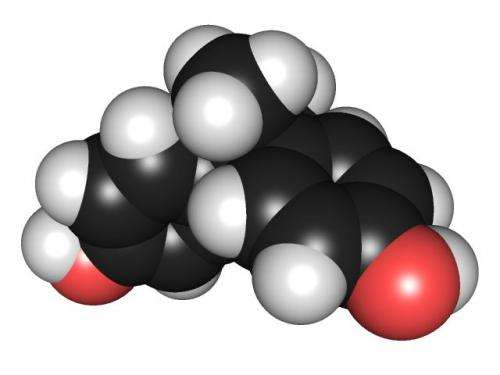May 28, 2013 report
BPA affects sex-based behavior in mice

(Medical Xpress)—Bisphenol A (BPA) is a common chemical found in household plastics. Previous studies on rodents show that BPA exposure is associated with problems with brain and behavioral development. There is evidence that, in human children, exposure to BPA adversely affects neurological development and emotional regulation and leads to increased aggression. In a study published in the Proceedings of the National Academy of Sciences, Frances Champagne and her team at Columbia University in New York reveal that mice exposed to BPA when in the womb experience sex-based epigenetic changes that affect brain tissue development and sex-specific behaviors.
Often used to line food and drinks cans, BPA is so pervasive that 90 percent of Americans have detectable levels of the chemical in their urine. However, some scientists claim that these levels are too low to have an effect. Nevertheless, because BPA affects estrogen receptors, others are concerned about its potential effects on fetal development and sexual differentiation. Earlier research has suggested that, in humans and animals, BPA exposure leads to loss of sexual dimorphism and has sex-based neurodevelopmental effects.
To counter criticism of previous studies on the effects of BPA, which used extremely high doses, Champagne and her colleagues gave pregnant mice a variety of doses, including some lower than that considered safe for humans. The researchers killed some of the offspring after weaning and dissected their brains. They found sex-specific changes in the expression patterns of estrogen receptor genes and in DNA methylation, signifying that BPA exposure results in sex-based epigenetic effects.
Behavioral tests on the remaining offspring revealed a disruption in sexual dimorphism. For example, the only rats engaged in fighting, a typically male behavior, were female rats that received the highest dose. Male mice were less likely to chase other mice and to engage in sniffing behavior, while the frequency of these behaviors increased in females. BPA exposure made males less anxious, while it increased anxiety in females. Both males and females became more aggressive as the BPA dose increased.
Champagne's team suggests that other researchers can extrapolate these results to humans, noting that the aggressive behavior demonstrated by the juvenile mice in the study could mirror aggressive behavior in human children.
However, some disagree with this conclusion. For example, Professor Richard Sharpe of the University of Edinburgh's Medical Research Council's Centre for Reproductive Health says that the lowest dose given in the study, 2 micrograms per kilogram per day, is still 10 to 20 times higher than normal BPA exposure. In addition, estrogen levels in pregnant humans are much higher than in pregnant mice; therefore the estrogenic effects of BPA would be much greater in mice than in people.
More information: Sex-specific epigenetic disruption and behavioral changes following low-dose in utero bisphenol A exposure, PNAS, Published online before print May 28, 2013, doi: 10.1073/pnas.1214056110
Abstract
Bisphenol A (BPA) is an estrogenic endocrine disruptor widely used in the production of plastics. Increasing evidence indicates that in utero BPA exposure affects sexual differentiation and behavior; however, the mechanisms underlying these effects are unknown. We hypothesized that BPA may disrupt epigenetic programming of gene expression in the brain. Here, we provide evidence that maternal exposure during pregnancy to environmentally relevant doses of BPA (2, 20, and 200 µg/kg/d) in mice induces sex-specific, dose-dependent (linear and curvilinear), and brain region-specific changes in expression of genes encoding estrogen receptors (ERs; ERα and ERβ) and estrogen-related receptor-γ in juvenile offspring. Concomitantly, BPA altered mRNA levels of epigenetic regulators DNA methyltransferase (DNMT) 1 and DNMT3A in the juvenile cortex and hypothalamus, paralleling changes in estrogen-related receptors. Importantly, changes in ERα and DNMT expression in the cortex (males) and hypothalamus (females) were associated with DNA methylation changes in the ERα gene. BPA exposure induced persistent, largely sex-specific effects on social and anxiety-like behavior, leading to disruption of sexually dimorphic behaviors. Although postnatal maternal care was altered in mothers treated with BPA during pregnancy, the effects of in utero BPA were not found to be mediated by maternal care. However, our data suggest that increased maternal care may partially attenuate the effects of in utero BPA on DNA methylation. Overall, we demonstrate that low-dose prenatal BPA exposure induces lasting epigenetic disruption in the brain that possibly underlie enduring effects of BPA on brain function and behavior, especially regarding sexually dimorphic phenotypes.
© 2013 Medical Xpress
















